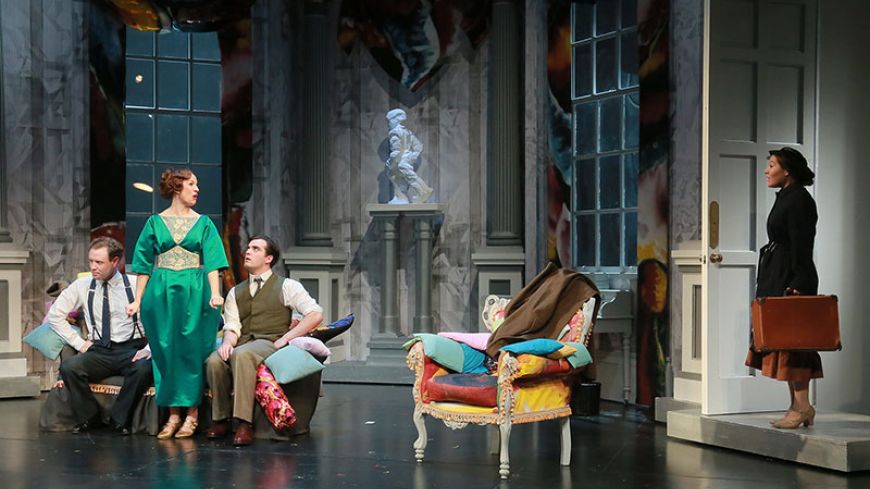
The British playwright, novelist and short story writer, W. Somerset Maugham was born in the British Embassy in Paris where his father worked. (This meant that he was born on British territory and avoided French military service).
During the Great War he travelled widely experiencing the British Raj in India and S. E. Asia, observing Colonial society at close quarters, the inspiration for his literary works.
“Marriage is a very good thing, but I think it's a mistake to make a habit out of it.” W. Somerset Maugham
"Home and Beauty" is set in late 1918 at the lavishly-decorated Westminster home of fashionable socialite, Victoria; her late husband Major William (Bill) Cardew was reported missing, presumed dead after the Battle of Ypres. After a respectable period of black dress mourning, she married Bill’s best friend, Major Frederick Lowndes.
We first see Victoria in a glamorous negligee, lying on a white silk chaise-longue having a manicure. She maintains her aristocratic image despite wartime rations (coal, butter, chocolate), ensuring of course that her bedroom and children’s nursery fires are lit.
When Frederick does not arrive home as expected, but a friend, debonair businessman, Leicester Paton happens to call round, she accepts his invitation to luncheon, with flirtatious relish.
Later, questioning Frederick about his absence at lunchtime, she becomes hysterical in anger. Bill would never have let her down, she screams, and she would like to have her first husband back again.
" I'm glad you feel like that about it," responds Frederick, "because he'll be here in about three minutes!."
Cue an hilarious scene of utter confusion and disbelief as Victoria looks aghast at the unfolding drama. Bill had rung him at his Club that morning from Harwich, asking him to break the news to her that he is alive and on his way back home.
And so enter Bill, wearing a plaid tweed suit and a grinning smile, embracing his wife and cheerfully chatting to his old chum Fred, as if his arrival is not unexpected. (His disappearance is briefly explained by amnesia and a spell in a German prison camp).
The farcical plot then becomes more complex as Nanny appears with Victoria's three month old baby - clearly not Bill’s son. His brisk comment is, 'You seem to have been busy, Victoria’ but totally flummoxed as to guess who the father may be.
“Home and Beauty” – the name taken from the patriotic song Death of Nelson – reflects the dual experience of War, the selfish side of humanity as well as the heroic.
The traditional class structure was gradually changing as domestic servants departed households for work in factories. Unable to employ a cook and parlour maid, Victoria is appalled that her pampered, privileged Downton Abbey-lifestyle is disintegrating.
The irony is that while hundreds of thousands of women lost their men at war, Victoria has the luxury of two husbands. (The American title of the play and Hollywood movie was “Too Many Husbands”).
But how can they decide who should stay? The ménage a trois engage in a battle of wits and game play to try and solve the problem. The action is brilliantly choreographed, silent-movie style as the two men fight over the right to stay or leave.
Noel Coward’s play “Blithe Spirit” has a similar scenario except reversed. Charles is like a shuttlecock flying between two jealous women, both batting for his affections: Ruth, his second wife and Elvira, his deceased wife, who appears as a ghostly figure only visible to Charles.
When writing “Home and Beauty”, Maugham had been married for five years while also involved in a gay relationship. Perhaps, an underlying theme to the play is his personal view that there is no such thing as a happy marriage and the best that can be hoped for is a tolerable one.
The period set across the three acts is beautifully designed from Victoria’s White Boudoir to the Abstract Cubism-painted Drawing-room and finally the cook-less Kitchen of post-war austerity.
Simon Pontin plays the dashing Major Lowndes with calm, military demeanor and racy charm (e.g. Anthony Andrews in Brideshead), while the more boisterous Major Cardew, (Reece Richardson), is like a gung-ho, Biggles character proudly home with his battered old khaki kit bag.
Rather bored with her two war-hero husbands, Victoria has an attractive alternative: Leicester Paton, a wealthy shipping magnate – snazzily portrayed by Alan J. Mirren as an elegant, raffish rogue, complete with smart black and white spats and a Rolls Royce.
Centre stage is the egocentric, vain and vivaciously wild-spirited, Victoria. Always seeking attention and wanting to get her own way, Isla Carter's polished performance is at times, eccentrically exaggerated as she flaunts and flounces around in a stunning emerald green frock.
The ensemble cast is excellent with astute characterisations from perfect RP to cockney accents.
Just like the genteel, romantic comedies of Wilde and Coward, this is a wonderfully witty, cynical satire about marriage, divorce and social class in Britain.
“Some of the critics called it cruel and heartless. It was written in the highest possible spirits. It was intended to amuse." W. Somerset Maugham
Show times
"Home and Beauty" continues in repertoire until 15 October, 2015
at the Pitlochy Festival Theatre as part of the summer season.
Travel recommendation:
Regular train service from Edinburgh to Pitlochry where the station is 10 minutes walk to the theatre. www.scotrail.co.uk

